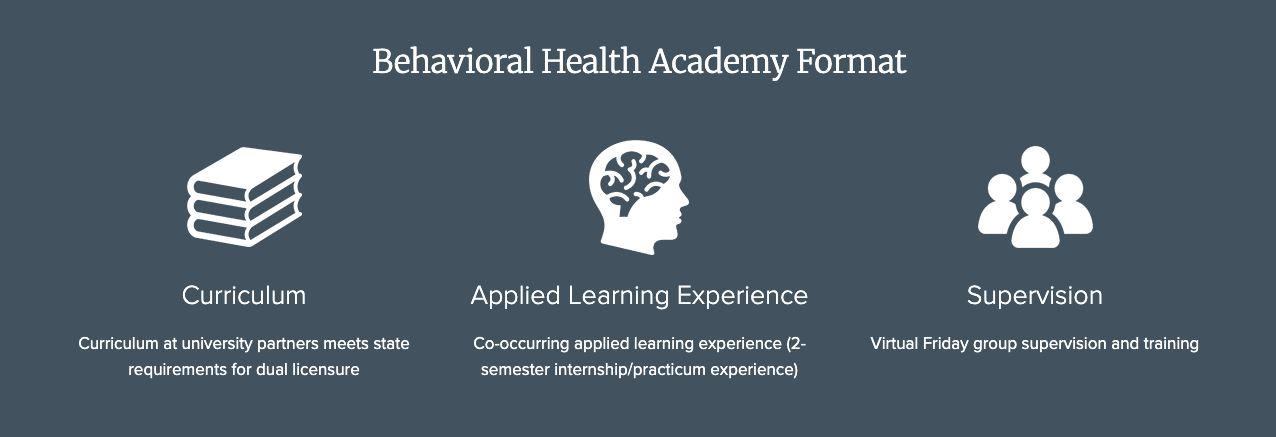Community Fairbanks Behavioral Health Behavioral Health Academy™ (BHA)
Saint Mary’s College, Notre Dame, Indiana, is proud to announce the Saint Mary’s College MSW Program partnership with the Community Fairbanks Behavioral Health Behavioral Health Academy™ (BHA), part of the Social Work and Mental Health Counseling initiatives in Indiana.
All 92 Indiana counties in 2023 were found to have federally designated shortages of behavioral health professionals. Suicide is the leading cause of death among adolescents ages 10-14, and more than half of Indiana teenagers with depression receive no treatment (https://bowenportal.org/playbook/).
In 2023, Indiana had one mental health provider for every 500 residents, far behind the national average of 320:1
(https://mhanational.org/the-state-of-mental-health-in-america/).
The Behavioral Health Academy™ (BHA), a specialized training and workforce development partnership involving Community Fairbanks Behavioral Health and multiple universities in the state of Indiana, is helping to meet that need. The Behavioral Health Academy offers students a focused pathway to careers in behavioral health. It does this in a very unique way – through providing students a pathway through college/university partnerships to not only increase their knowledge of mental health treatment, but also to simultaneously address substance use issues with clients.
The Community Fairbanks Behavioral Health Behavioral Health Academy™ impacts Hoosiers through helping to increase the number of behavioral health therapists trained to treat both mental health and substance use issues, making comprehensive behavioral health treatment more accessible throughout the state. In doing so, students are given the opportunity to enter a MSW-level field placement that addresses mental health issues and substance use issues. Saint Mary’s College MSW students already have the opportunity to be trained in clinical social work, the specialty area designated by the MSW Program for the Council on Social Work Education (CSWE). Adding learning goals related to substance use prevention, assessment, and treatment in working with clients and client systems on all three levels (micro, mezzo, and macro) strengthens the students’ ability to apply their knowledge of the DSM-5-TR to directly working with clients.
Behavioral health issues are complex in today’s environment and are often affected by intersectionality, factors such as socioeconomic status, gender, ethnicity, race, education, and accessibility of resources. The Behavioral Health Academy (BHA) philosophy emphasizes a co-occurring treatment lens, rather than separating mental health and substance use treatment. Clients are viewed as being optimally served by addressing the whole person and preparing clinical social workers to confidently, competently, and simultaneously provide both mental health and substance use treatment.
The Behavioral Health Academy has been fortunate to partner with statewide agencies and college/university programs as well as to secure funding to support the growth of the Behavioral Health Academy. This important work is generously funded by multiple grants aimed at increasing the behavioral health workforce in Indiana and treating the complex mental health and substance use needs of Indiana residents.
Important characteristics of the Saint Mary’s College MSW Program Partnership with the Behavioral Health Academy:
- Degree Pathway & Dual Licensure is provided to MSW students participating in the BHA Partnership: Students earn a Master’s Degree in Social Work (MSW) and are further prepared to apply for dual licensure—as both Licensed Clinical Social Workers (LCSW) and Licensed Clinical Addiction Counselors (LCAC). All four full-time faculty teaching in the MSW Program, including Eliabeth Brueseke, the MSW Program Director of Field Education, have earned the LCSW clinical social work license. The director of the MSW Program (Frances Bernard Kominkiewicz) is additionally licensed as a LCAC.
- Hands-On Practicum: Each MSW student is placed in a supervised agency-based field placement that not only meets the learning needs of the clinical MSW, but also of the licensed clinical addictions counselor. This placement includes evidence-based practicum experiences treating clients with co-occurring mental health and substance use challenges.
Financial Support & Career Boost: Participants receive stipends during practicum semesters, additional and specialized supervision, priority job interviews, and potential post-graduation employment incentives.

